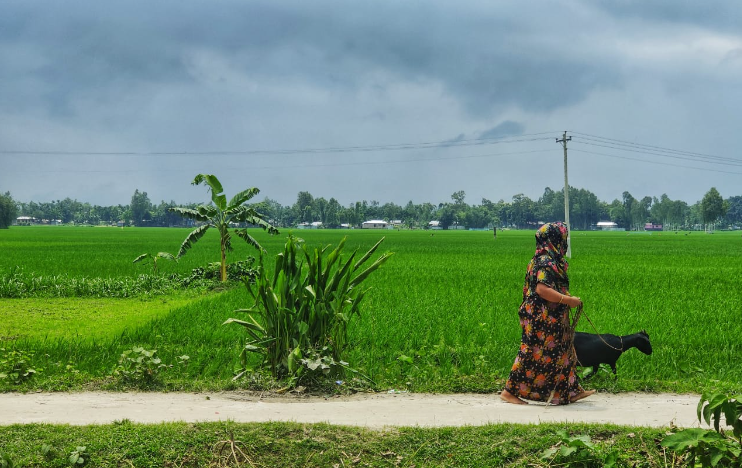When I joined iFarmer, I was consistently told that my job requires constant presence at the field level, which meant traveling to different parts of the country. While the thought of travel intrigued me, truth be told, I was also extremely nervous about how I would come to places I have never been to. Trains of million thoughts ran through my mind until the day arrived where I packed my bags and headed to Joypurhat along with my team.
From the very beginning of our field visit, I was taken away by the beauty of the green paddy fields. Our first stop was at Joypurhat, where I found people to be very cheerful, friendly and helpful. We talked to different iFarmer stakeholders in different areas. Since the bazaars we visited were located far away from the main city, we had to take an auto every time to reach our destination. Hour long rides with fresh air and scenic views later, we would arrive at the big bazaar areas. Our team managed to gather everyone around and conduct focused group discussions to understand the process of supply chain from the agri suppliers and farmers there. I had been still grasping the business models of iFarmer from my supervisor, Archi apu, but hearing it first hand from the stakeholders really put a lot of things into perspective. Hearing suppliers talk about how iFarmer eased their business really made me feel like my work, along with everyone else’s at iFarmer, was all purposeful and worthwhile.

Focused group discussion with suppliers at Akkelpur, Joypurhat
Our next stop was Natore, where we visited to run a pre test for our annual Impact Assessment . Since we stayed the night in the city, visiting the farmers’ households in the remote areas was a great deal of distance that we had to cover. Mind you, I had never been to such remote places, at the farthest corners of the country. So when we reached our destination after one local bus ride, a cng ride, an auto ride and a van ride, I literally felt like I had completed a great feat!

My first experience interviewing women farmers and talking about how they were empowered with iFarmer beside them.
We went to the farmers' households one by one by riding on the van. My first assignment when I joined iFarmer was to prepare an impact questionnaire on women farmers. I remember clearly how I was struggling to relate when my team members were telling me how farmer responses would be like and how it would affect my questions. So when I actually spoke to the farmers myself, I got better clarity on how our organization is impacting these marginalized lives.. Talking to each farmer was like getting a snapshot of their lives filled with great struggles. Each farmer had a different story to tell, and it was amazing to be able to hear it through their own words. That is when I realized that it is quite impossible to capture this kind of information, sitting in our Dhaka office, in our desks, behind the laptop screens.
Our field visit lasted for 7 days, where each day, we went to a different region in Joypurhat and Natore. The best thing about my first field visit was that in each location, I could experience something different. In Joypurhat, it sort of felt like an easing of the process – taking it slow and understanding the entire concept of supply chain operations of iFarmer. In Natore, it was challenging – walking on the narrow broken roads to farmer households one by one, talking to them in person and riding back from each of their houses in a van. But something that was similar was the warmth, hospitality and the simplicity of the farmers in the regions. It was amazing to see how they hold their heads up high and continue to push forward with the kind of struggling lives they live everyday. That's when I felt like measuring impact is not just about the big numbers, it is about reflecting the lives of these human beings in our work and understanding where iFarmer stands today because of their relentless efforts.
01302536026
01784167973
